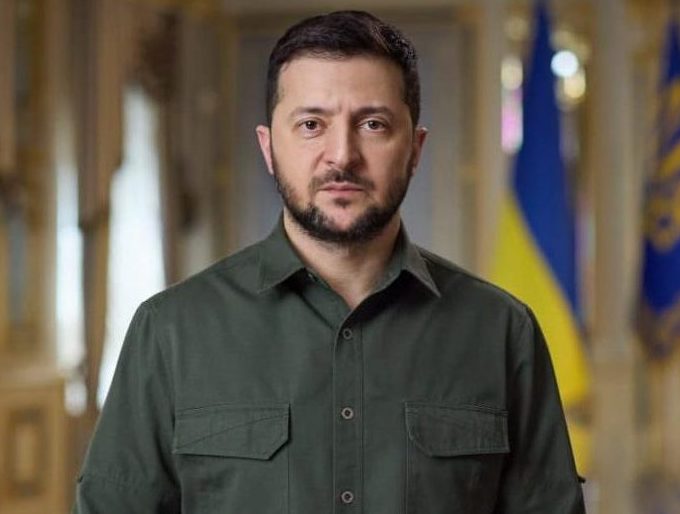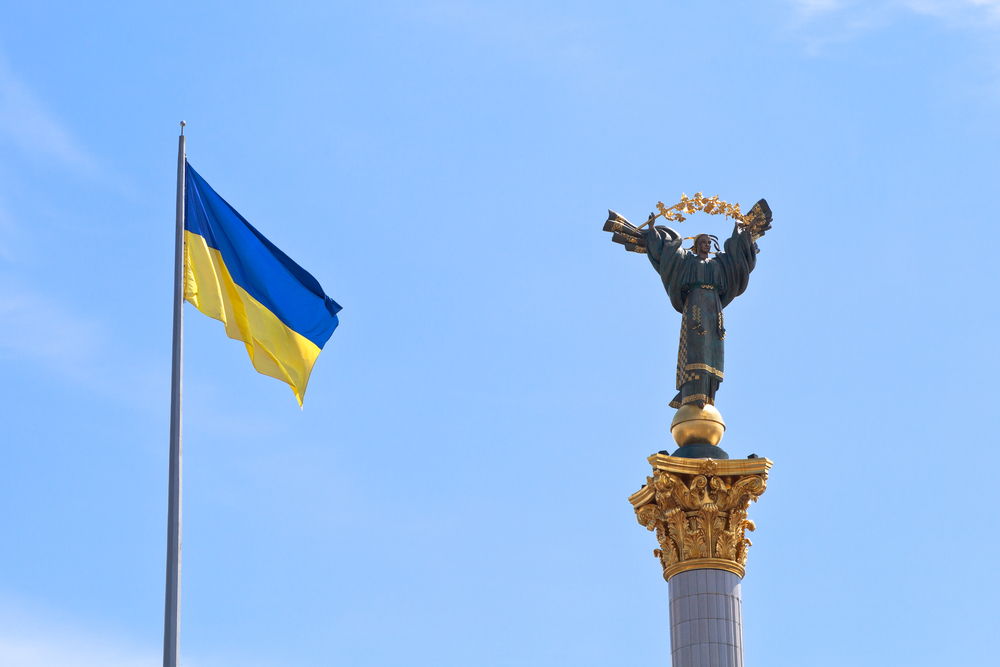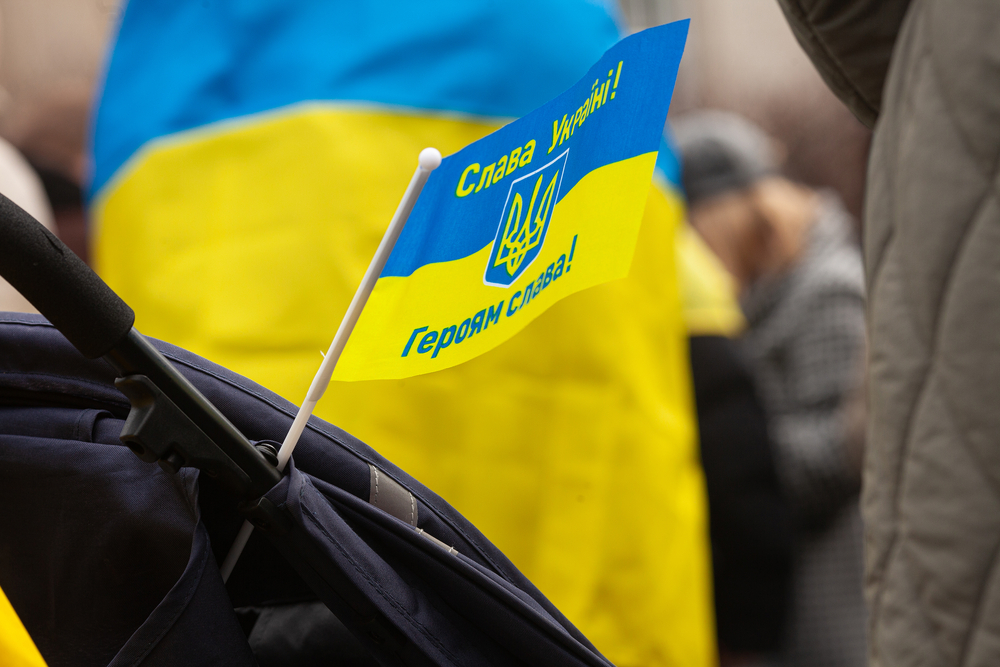Well in advance before the presidential election in Ukraine one sentiment has been expressed quite often: it would be good, if Ukrainian Macron would emerge. Meaning an unexpected political figure who could become a president on a positive push to modernize the country.
Now the results for the first round are known. A clear first place is held by Volodymyr Zelensky with more than 30%. Incumbent Petro Poroshenko came second with almost 16%, former Prime Minister Yulia Tymoshenko is third with almost 13.5%.
Has a Ukrainian Macron emerged? Zelensky has a certain semblance to the President of France. Both are of the same age, of similar height, switched to politics from business. Deeper, though, differences are big. Macron’s elite education and work in the government prepared him well for the presidency, he had a plan for reforms. Zelensky’s experience with political life has been limited mostly to political satire and he still lacks a concrete program. At the same time, what they both share is positive rhetoric.
Comparison to the US election 2016
Every situation is unique. Still, drawing a comparison may help to understand things better. For that matter, the US presidential election 2016 provides a much better insight into the Ukrainian election. Last year a playing field of potential contenders in Ukraine has been quite similar to that of Republican primaries: a lot of candidates with a chance to grab a victory and an absence of a front-runner with a comfortable lead.
The main factor in both elections has been a huge dissatisfaction with the political class among voters. As both Donald Trump and Zelensky have been practically the only political outsiders, they succeeded in amassing support among protest voters.
Similarities do not end here. Both men had not had any experience in the policy before entering the election campaigns. They were, however, celebrities and were able to transform their popularity into political support. The reason is that they had huge experience in show business, that is they knew well how to make things popular and promote them. Trump used this expertise to cast himself as an anti-establishment candidate who would defend the interests of American white voters.
The main factor in both elections has been a huge dissatisfaction with the political class among voters. As both Donald Trump and Zelensky have been practically the only political outsiders, they succeeded in amassing support among protest voters.
Similarities do not end here. Both men had not had any experience in the policy before entering the election campaigns. They were, however, celebrities and were able to transform their popularity into political support. The reason is that they had huge experience in show business, that is they knew well how to make things popular and promote them. Trump used this expertise to cast himself as an anti-establishment candidate who would defend the interests of American white voters.
Zelensky’s ‘invisible’ campaign
The same applies to Zelensky. When he appeared as a clear front-runner in January, many were surprised. Nevertheless, it came out of nowhere. Western mass media paid their attention mostly to Zelensky’s role in a TV series Servant of the People. He plays there an honest and principled teacher elected as a President of Ukraine.
At the same time, his political campaign remained mostly unseen by the outside observers. Zelensky started his ‘invisible’ campaign in June last year by publishing a short video-statement in social media hinting at his interest to run for a presidency. Subsequently he regularly, but not too often, published videos, commenting political and social developments. Those gathered on Instagram hundreds of thousands of views. This campaign aimed at shaping Zelensky’s image of an average guy who has his views and talks to people in a language they understand.
While Poroshenko and Tymoshenko started massive advertising in summer 2018, Zelensky’s campaign last year was not only much more subtle but also cost practically nothing. The same applied to Trump, who had spent on his advertising far less money than his main opponents in the 2016 primaries and still has beaten them quite easily.
At the same time, his political campaign remained mostly unseen by the outside observers. Zelensky started his ‘invisible’ campaign in June last year by publishing a short video-statement in social media hinting at his interest to run for a presidency. Subsequently he regularly, but not too often, published videos, commenting political and social developments. Those gathered on Instagram hundreds of thousands of views. This campaign aimed at shaping Zelensky’s image of an average guy who has his views and talks to people in a language they understand.
While Poroshenko and Tymoshenko started massive advertising in summer 2018, Zelensky’s campaign last year was not only much more subtle but also cost practically nothing. The same applied to Trump, who had spent on his advertising far less money than his main opponents in the 2016 primaries and still has beaten them quite easily.
American lessons for Zelensky
There is one big difference that sets Trump and Zelensky apart, the nature of American elections. While Trump started his bid as a political novice one and a half year before the election day, at the end of the campaign he had a program distilled through the Republican primaries, 12 debated with his intraparty rivals, and three debated with Democratic nominee Hillary Clinton. Zelensky participated in none debate. The same applies to his main rivals.
Without Republicans taking over his campaign, Trump probably couldn’t have won the general election. After the election, he had a long Republican bench to choose members for his cabinet. Trump’s main achievements as a President would have been also impossible without his party. It was a Republican leadership of the Congress who pushed tax reform and it was conservative foundations and Senate Republicans who enabled the appointment of the two conservative judges to the Supreme Court.
Zelensky doesn’t have big party resources at his disposal. If Trump’s presidency could offer any lesson, it is the importance of professionals in key positions. Jim Mattis was regarded as a point of stability during his tenure as a minister of defense. Zelensky is still yet to announce his nominees for the key positions, like ministers of foreign affairs or defense. These choices will most probably have an impact on his chances in the runoff on April 21.
Without Republicans taking over his campaign, Trump probably couldn’t have won the general election. After the election, he had a long Republican bench to choose members for his cabinet. Trump’s main achievements as a President would have been also impossible without his party. It was a Republican leadership of the Congress who pushed tax reform and it was conservative foundations and Senate Republicans who enabled the appointment of the two conservative judges to the Supreme Court.
Zelensky doesn’t have big party resources at his disposal. If Trump’s presidency could offer any lesson, it is the importance of professionals in key positions. Jim Mattis was regarded as a point of stability during his tenure as a minister of defense. Zelensky is still yet to announce his nominees for the key positions, like ministers of foreign affairs or defense. These choices will most probably have an impact on his chances in the runoff on April 21.
Who is Ukrainian Clinton?
There is no comparison in the US 2016 for the incumbent Poroshenko; however, there is one other candidate whose results could be explained by the US election. Both Clinton and Tymoshenko have been considered favorites well before the election day. And both failed. Why?
Tymoshenko has probably the longest political career (more than 20 years) among the top-politicians in Ukraine. Clinton belongs to the establishment for more than 40 years. Not helpful credentials when so many voters are dissatisfied with the establishment. Besides, both women were too confident in their victories. While declining to participate in a debate with journalists and civil society representatives two days before the election day, Tymoshenko said: “I firmly believe that after the first round, when we win, I will come to the studio to debate with you”.
Voters knew very well what both women stand for. Voting for Clinton meant defending Obamacare and voting for Tymoshenko meant increasing welfare. At the same time, both candidates were not very good at explaining their programs to the masses. Clinton mostly tried to present herself as a bulwark against Trump. That didn’t work in the end. Likewise, Tymoshenko dedicated her speeches mostly to criticizing the incumbent Poroshenko. That worked even worse with Ukrainian voters having many other alternatives.
Tymoshenko has probably the longest political career (more than 20 years) among the top-politicians in Ukraine. Clinton belongs to the establishment for more than 40 years. Not helpful credentials when so many voters are dissatisfied with the establishment. Besides, both women were too confident in their victories. While declining to participate in a debate with journalists and civil society representatives two days before the election day, Tymoshenko said: “I firmly believe that after the first round, when we win, I will come to the studio to debate with you”.
Voters knew very well what both women stand for. Voting for Clinton meant defending Obamacare and voting for Tymoshenko meant increasing welfare. At the same time, both candidates were not very good at explaining their programs to the masses. Clinton mostly tried to present herself as a bulwark against Trump. That didn’t work in the end. Likewise, Tymoshenko dedicated her speeches mostly to criticizing the incumbent Poroshenko. That worked even worse with Ukrainian voters having many other alternatives.
Divisions in societies
Many previous elections in Ukraine have been won through an East-West political cleavage. People in the Western half of Ukraine voted mainly the pro-Western politicians and parties, while people in the Eastern half voted pro-Russian. This changed due to the Euromaidan Revolution and Russian aggression.
In 2014 Poroshenko won in all the regions of the country. In 2019 he retained support mostly in the West. Now Zelensky is a candidate beyond a geographical division, he won in 20 out of 25 regions.
In the USA in 2016 geographical division played a big role. At the same time, Trump’s inflammatory rhetoric made him into a very divisive figure: some adored him no matter what he does or says, while others couldn’t imagine him to be a President of the US.
In 2014 Poroshenko won in all the regions of the country. In 2019 he retained support mostly in the West. Now Zelensky is a candidate beyond a geographical division, he won in 20 out of 25 regions.
In the USA in 2016 geographical division played a big role. At the same time, Trump’s inflammatory rhetoric made him into a very divisive figure: some adored him no matter what he does or says, while others couldn’t imagine him to be a President of the US.
The 2019 election in Ukraine produced deep divisions that have nothing to do with geopolitics. It is being widely discussed in the country that a lot of citizens publicly despised the choice of others. Inflammatory statements of some politicians were only one reason for this (unlike Trump, Zelensky has been quite measured in his statements). The other reason is that people are deeply worried because of the war in the East and because the country hasn’t been changing as fast as many had hoped. More than two years into Trump’s presidency the USA hasn’t become less divided. So, the lesson for both Poroshenko and Zelensky is not to deepen divisions in the run-up to the second round and bridge them after the second vote.
Who will be the final winner, is still completely undecided, despite Zelensky’s almost double advantage over his rival. And here practically everything lies in hands of the political novice. If he shows that he has an understanding of how to bring Ukraine forward, then Poroshenko won’t be able to do much. If Zelensky fails in any way, it will open a chance for the current President.
Who will be the final winner, is still completely undecided, despite Zelensky’s almost double advantage over his rival. And here practically everything lies in hands of the political novice. If he shows that he has an understanding of how to bring Ukraine forward, then Poroshenko won’t be able to do much. If Zelensky fails in any way, it will open a chance for the current President.
Yuriy Sheyko, a freelance correspondent based in Brussels, for Promote Ukraine
04.04.2019 • by promoteukraine






 UA
UA FR
FR DE
DE

